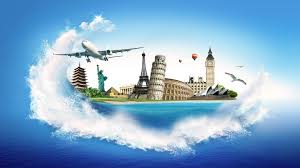The Power of Tourism in Global Relations
Recent statements from industry leaders highlight the pivotal role tourism plays in connecting nations around the world. At the FAITH Conclave 2025, the External Affairs Minister emphasized that tourism often outshines traditional diplomacy in fostering international relationships. The discussion centered on Prime Minister Modi’s concept of the “3T framework,” which emphasizes the importance of tourism alongside trade and technology.
The 3T Framework: Tourism, Trade, and Technology
This framework aims to enhance India’s global standing by promoting tourism as a crucial element in foreign relationships. The call to action for the Indian diaspora to bring friends when visiting India echoes the underlying belief that personal connections can amplify a nation’s visibility and attractiveness. As tourism bridges cultural gaps and fosters personal ties, its influence is felt deeply in international dynamics.
Infrastructure Development Driving Tourism Growth
Significant strides in infrastructure over the past decade have set the stage for this tourism expansion. Dramatic improvements have been made to key transport links; for instance, India’s airport capacity has doubled, advancements in railways have increased connectivity, and highways have been upgraded extensively. The UDAN initiative has made domestic air travel more accessible, while the implementation of an e-visa system simplifies the travel process for international visitors.
A Focus on Cultural Immersion
India’s G20 Presidency has strategically showcased cultural diversity to global delegates, facilitating immersive experiences in historical settings. High-profile events held near heritage sites allowed delegates to take home transformative insights into the richness of Indian culture. Such engagements promote understanding and foster goodwill, as shared experiences often translate into lasting impressions that influence future interactions.
International Collaborations in Tourism
The recent interest from Vietnam in altering its visa policy for Indian travelers demonstrates a trend of countries recognizing tourism’s potential to strengthen bilateral relations. Targeting markets like MICE (Meetings, Incentives, Conferences, and Exhibitions) and wedding tourism, Vietnam aims to cater to the evolving needs of Indian tourists. This specificity in outreach highlights a growing awareness of demographics in developing tourism strategies.
Global Heritage and Tourism
India’s recent additions to UNESCO’s World Heritage list serve as testaments to its rich cultural heritage, thus attracting more visitors focused on cultural tourism. Efforts such as the “Heal in India” initiative have also gained traction, bolstered by the popularity of AYUSH (Ayurveda, Yoga, Unani, Siddha, and Homeopathy) practices and extensive promotion of International Yoga Day.
Diplomatic Trends in Tourism
Interestingly, high-level diplomatic undertakings are now occurring outside traditional venues. The warm receptions of foreign leaders in cities like Jaipur and Vadodara reflect India’s intention to utilize regional diversity to promote itself on the global stage. This approach not only emphasizes the country’s cultural wealth but also showcases how tourism can become a soft power tool, facilitating diplomatic relations.
Economic Impact of Tourism
Jaishankar recognized tourism’s substantial economic contributions, linking it to broader national objectives such as economic self-sufficiency and development. Emphasizing the sector’s capacity to stimulate employment and energize the local economy, he noted how tourism seamlessly integrates with national interests, illustrating its crucial role in achieving the vision of a developed India.
Historical Context of Tourism’s Role
Historically, tourism has evolved significantly, shaping economies and interactions globally. From the early days of travel for trade and exploration, tourism has transformed into a multifaceted industry that fuels economic growth, cultural exchange, and diplomatic ties. Understanding this historical context is fundamental to appreciating tourism’s current significance in international relations.
Future Significance of Tourism
As global tourism continues to flourish, its potential for fostering international dialogue and understanding grows ever more vital. Countries are increasingly harnessing the power of tourism to strengthen relationships, facilitate cultural exchanges, and build economic partnerships. Given the prevailing uncertainties in international relations, tourism stands as a dependable avenue for promoting peace and cooperation.
Conclusão
In conclusion, the insights from the recent discussions on the intersection of tourism and global diplomacy underscore the transformative power this industry wields in connecting nations. As tourism continues to develop robust frameworks for cultural exchange, it remains a promising avenue for enhancing international relations. For those interested in exploring nautical adventures, GetBoat.com serves as an invaluable resource for renting boats and yachts to make the most of one’s journey around beautiful marine destinations. The interplay between tourism and sailing experiences further enriches global interactions, offering boundless opportunities for exploration and camaraderie.

 How Tourism Connects Nations Beyond Diplomacy">
How Tourism Connects Nations Beyond Diplomacy">
